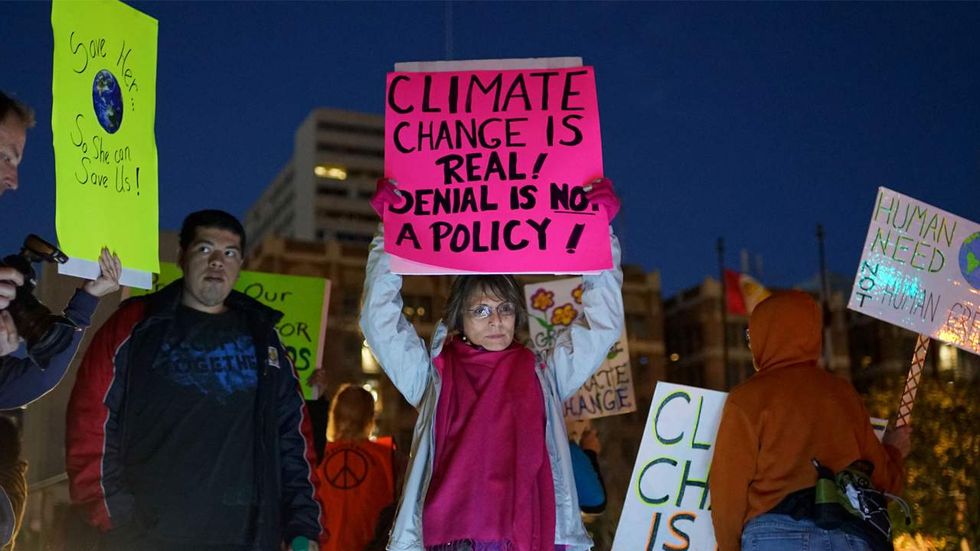
NOAA report says existing scientific data does not support the claim there is currently a link between hurricanes and global warming. (SANDY HUFFAKER/AFP/Getty Images)

During an October 2016 campaign stop, Hillary Clinton and former Vice President Al Gore repeated a common claim made by climate alarmists about the alleged link between increased global temperatures and hurricanes—one that the National Oceanic and Atmospheric Administration is now saying has yet to be proven.
“Hurricane Matthew was likely more destructive because of climate change,” Clinton said, according to a report by the Washington Post. “Right now, the ocean is at or near record high temperatures, and that contributed to the torrential rainfall and the flash flooding that we saw in the Carolinas. Sea levels have already risen about a foot, one foot, in much of the southeast, which means that Matthew’s storm surge was higher, and the flooding was more severe.”
Gore expanded on Clinton’s argument.
“It spun up from a tropical storm into a category 5 hurricane in just 36 hours,” Gore said. “That’s extremely unusual.”
Although these and similar claims suggesting hurricanes have worsened or increased in frequency as a result of global warming have been used often and with certainty by climate alarmists, the NOAA is now saying there is no definitive evidence that proves the alleged link. The NOAA is a federal government agency in the Department of Commerce that argued in favor of the theory man is primarily responsible for rising global temperatures under President Barack Obama.
According to a new report by the NOAA’s Geophysical Fluid Dynamics Laboratory reviewing existing evidence, “It is premature to conclude that human activities–and particularly greenhouse gas emissions that cause global warming–have already had a detectable impact on Atlantic hurricane or global tropical cyclone activity.”
NOAA said despite the fact that there currently is no evidence to support the claim, it believes there will be at some point in the future (sort of).
According to the alarmist NOAA, “Anthropogenic warming by the end of the 21st century will likely cause tropical cyclones globally to be more intense on average (by 2 to 11% according to model projections for an IPCC A1B scenario). This change would imply an even larger percentage increase in the destructive potential per storm, assuming no reduction in storm size.”
They also said the odds are “better than even” (how scientific of them!) “anthropogenic warming over the next century will lead to an increase in the occurrence of very intense tropical cyclone in some basins–an increase that would be substantially larger in percentage terms than the 2-11% increase in the average storm intensity.”
However, NOAA’s report also says, “This increase in intense storm occurrence is projected despite a likely decrease (or little change) in the global numbers of all tropical cyclones.”
Put simply, NOAA says there is no evidence hurricanes are more intense or have increased in frequency because of global warming, but it believes hurricanes could become more intense (by 2-11 percent) by 2100, even though there will likely be less total tropical cyclones.
(H/T: Watts Up With That)
Justin Haskins